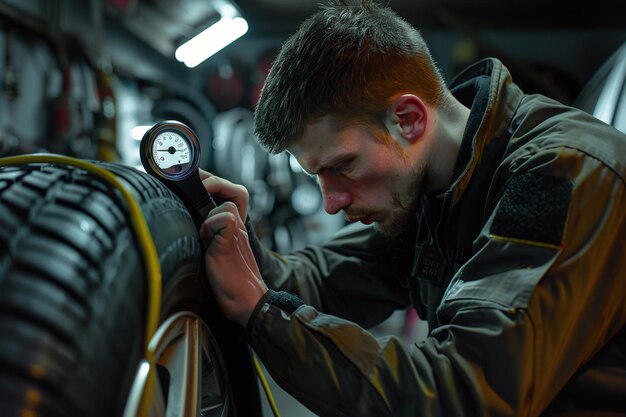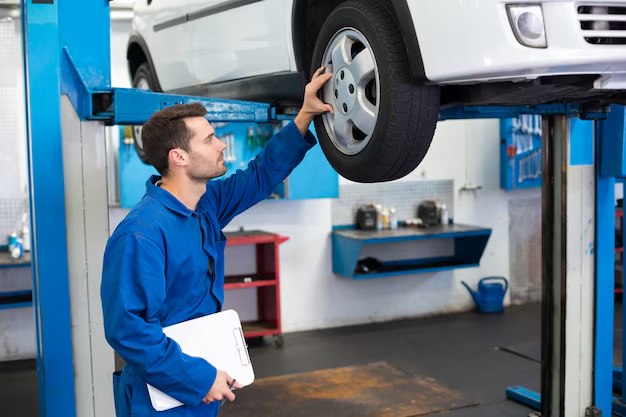Your tires are where the rubber meets the road—literally. They’re the only part of your vehicle that actually touches the pavement, and they play a huge role in how your car handles, how much fuel it uses, and—most importantly—how safe it is to drive.
At Mike’s Automotive in Pawling, we’ve seen it all: uneven tire wear from neglect, sidewall blowouts from poor inflation, and tires that had plenty of tread but were too old to be safe. The good news? A few simple tire maintenance tips can go a long way toward extending the life of your tires and keeping you safe on the road.
Whether you’re commuting through Dutchess County or road-tripping upstate, these tire care essentials will help your ride go the distance.
Check Your Tire Pressure—Monthly
Proper tire pressure is the foundation of all good tire maintenance. Too much air? You’re at risk of a rough ride and uneven center wear. Too little? Your tires will wear on the outer edges, reduce your fuel economy, and are more likely to overheat and fail.
The ideal tire pressure for your car is listed in your owner’s manual and often inside the driver’s door jamb. It’s not the number stamped on the tire—that’s the maximum pressure.
Checking your pressure monthly (and before any long trips) with a quality tire gauge is a quick and easy way to extend tire life. Make sure to check all four tires when they’re cold (before you’ve driven more than a mile or two), and don’t forget your spare while you’re at it.
Pro tip from Mike: Here in Pawling, temperature swings can make your tire pressure fluctuate. For every 10-degree drop in temperature, your tires can lose 1 PSI. Fall and winter are especially important times to check in.
Rotate Your Tires Regularly
Your front tires wear differently than your rear ones. That’s especially true on front-wheel drive vehicles where the front tires handle both steering and power delivery. Over time, this uneven wear can lead to noisy driving, reduced traction, and premature tire replacement.
Rotating your tires—moving them from one position on the car to another—helps them wear more evenly. This simple service typically needs to be done every 5,000 to 7,500 miles, or as recommended by your vehicle manufacturer.
At Mike’s Automotive, we can rotate your tires during your oil change, saving you time and helping you stay on schedule. Regular rotations are one of the most cost-effective ways to get the most out of your tire investment.
Get Regular Wheel Alignments
Your car’s alignment refers to how its wheels are positioned relative to each other and the road. If your alignment is off—even slightly—your tires can wear out fast and unevenly. You might notice your steering wheel pulling to one side, vibration through the wheel, or a crooked steering wheel when you’re driving straight.
Even minor bumps with a curb or pothole can throw your alignment off. That’s why we recommend getting your alignment checked annually, or anytime you hit something hard, notice strange handling, or replace tires or suspension components.
A wheel alignment is like hitting the reset button for your tires. It restores the factory settings that let your tires wear evenly and safely.
Inspect Your Tires for Wear and Damage
You don’t have to be a mechanic to do a quick tire check. Make a habit of walking around your vehicle and visually inspecting your tires for any issues:
- Tread depth: Use the penny test. Insert a penny into the tread with Lincoln’s head down. If you can see the top of his head, it’s time for new tires.
- Cracks or bulges: These can indicate internal damage or aging and can lead to blowouts.
- Uneven wear: If one side of the tire is wearing faster than the other, it might be time for a rotation or alignment.
- Objects in the tire: Nails, screws, or glass embedded in the rubber can lead to slow leaks or flat tires.
Spotting small problems early can save you from big headaches (and costs) down the road.
Don’t Ignore Your Tire Age
Even if your tires look fine, they have a shelf life. Most tire manufacturers recommend replacing them every six years, and definitely by ten years—even if there’s tread left. That’s because the rubber compounds break down over time, making the tires more prone to failure.
You can check the age of your tires by looking at the DOT code stamped on the sidewall. The last four digits show the week and year the tire was made (e.g., 2321 = 23rd week of 2021).
If you’re not sure how old your tires are or whether they’re still safe, swing by Mike’s Automotive. We’ll check them out for free and give you an honest assessment.
Balance and Suspension Matter Too
Tire care doesn’t exist in a vacuum—your suspension and wheel balance play a big role in how your tires wear.
- Wheel balancing ensures that the tire’s weight is evenly distributed around the axle. An unbalanced tire can cause vibrations, uneven tread wear, and damage to suspension parts.
- Suspension problems like worn shocks or struts can make your tires bounce excessively, leading to scalloped or cupped tread wear.
If your ride feels bouncy, shaky, or you hear odd noises while driving, let us take a look. Catching these problems early helps prevent premature tire damage.
Be Mindful of How and Where You Drive
Driving habits and road conditions have a huge impact on your tire lifespan. While some wear and tear is inevitable, there are ways to drive smarter:
- Avoid potholes and road debris when possible.
- Take turns and corners smoothly, especially at higher speeds.
- Don’t overload your vehicle, which puts extra pressure on your tires.
- Slow down on rough or gravel roads to reduce impact damage.
Here in Pawling and the surrounding areas, road conditions can be unpredictable, especially in the winter. A little extra caution goes a long way toward protecting your tires and your vehicle.
Choose the Right Tires for Your Vehicle and Climate
Not all tires are created equal. The right tire for your car depends on factors like your driving style, local weather, and vehicle type. For example:
- All-season tires are a good general-purpose option for many drivers.
- Performance tires offer better grip and handling but may wear faster.
- Winter tires are essential if you frequently drive in snow or icy conditions.
- Touring tires are designed for comfort and long tread life, great for commuters.
At Mike’s Automotive, we’ll help you pick the best tires for your specific needs and budget—and we’ll install and balance them properly so you hit the road with confidence.
Trust a Local Team That Knows Tire Care Inside and Out
Tire maintenance might seem like a chore, but it’s one of the smartest investments you can make in your car’s performance, safety, and longevity. Taking a few simple steps—checking pressure, rotating regularly, watching for wear, and staying on top of alignments—can extend tire life significantly.
At Mike’s Automotive in Pawling, tire care isn’t just another service—it’s part of how we keep our neighbors safe on the road. With over 25 years of experience and dealership-level training, Mike and the team take pride in delivering honest, expert service you can count on.
If you’re not sure where your tires stand, or you want to make sure your maintenance routine is on track, give us a call or stop by. We’ll inspect your tires, answer your questions, and make sure your vehicle is ready for wherever the road takes you.
Let’s keep your car riding smoothly and safely. Schedule your tire check or rotation at Mike’s Automotive today—your tires will thank you.


